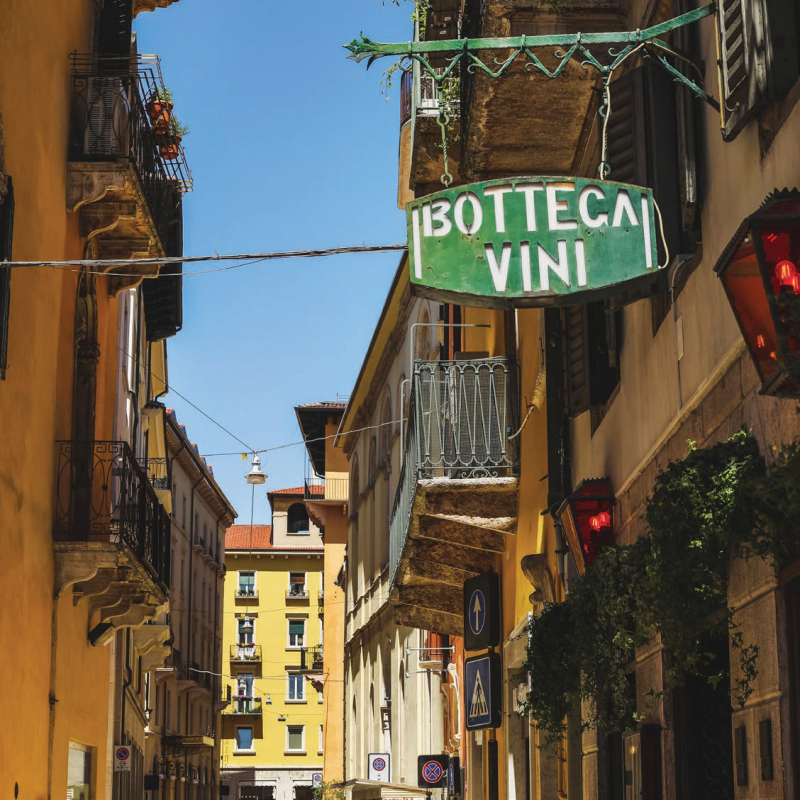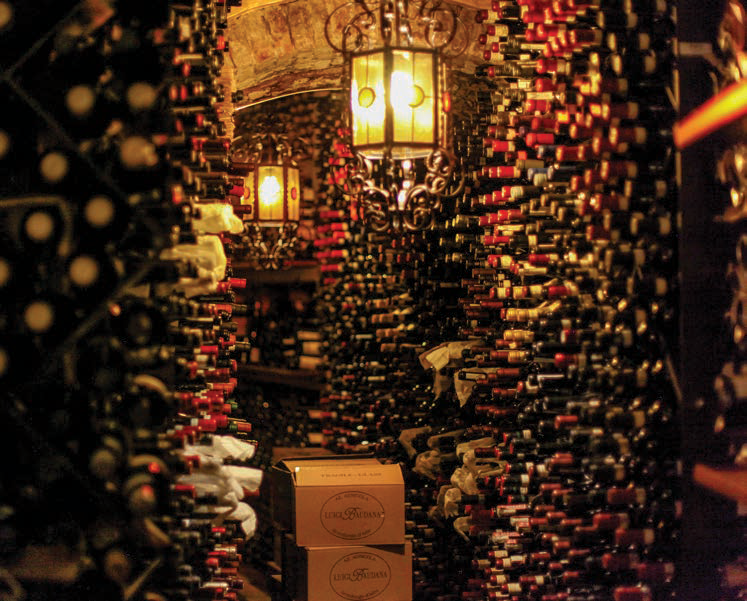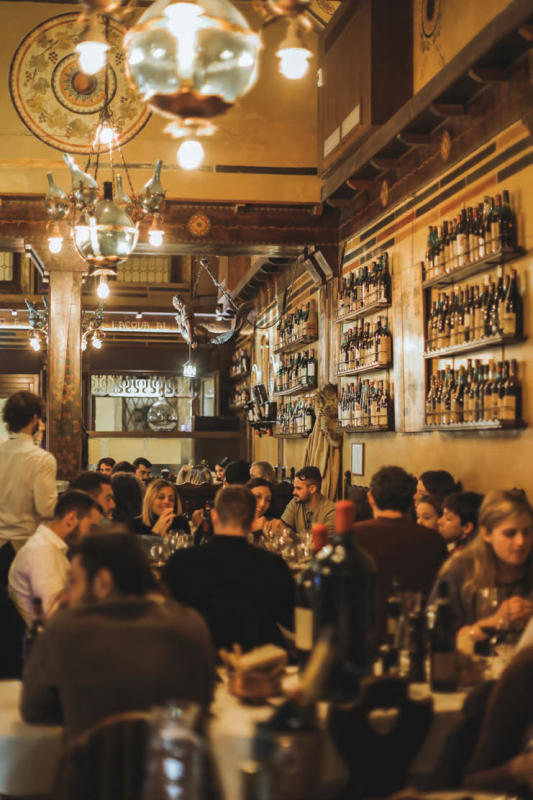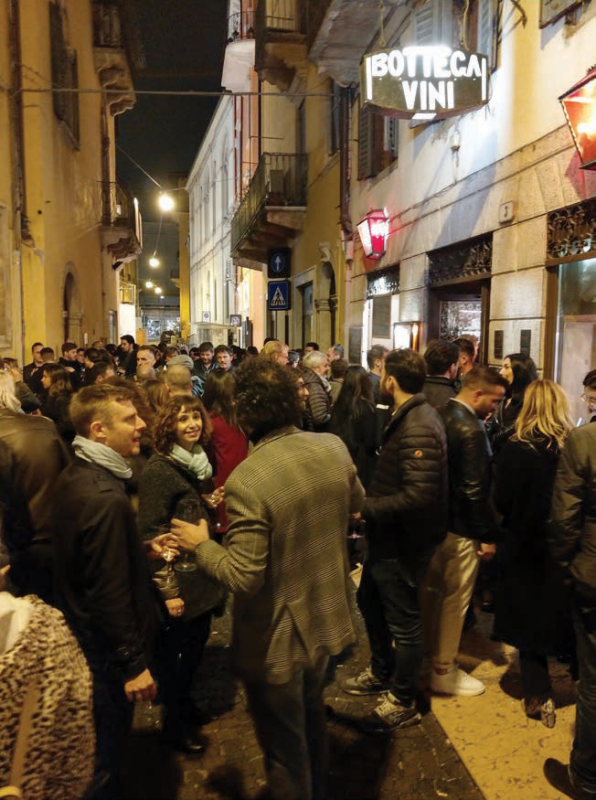This article originally appeared in the Fall/Winter 2022-2023 print issue of Quench Magazine.
“There is no wine world outside the walls of Bottega del Vino, but only purgatory, torment, hell.”
We take the liberty, entrusting in Shakespeare’s approval, of modifying the famous phrase from Romeo and Juliet. Tourists the world over see Juliet and her statue as the symbol of Verona, just as Verona’s Bottega del Vino is the Olympus of wine lovers everywhere, a centuries-old beacon in the culture of good drinking.
Recognised as one of the oldest historical establishments in Italy by the Locali Storici d’Italia association, which promotes institutions that have made history within Italy’s borders, the roots of this legendary Veronese venue dates back to the 15th century. It was then known as Osteria lo Scudo di Francia, since the upper floor housed the French consulate; the alley sporting the venue’s signboard still goes by that name.
Under the Austro-Hungarian Empire in the 1800s it became Osteria Biedermeier, an influence still visible in the decor, which has remained largely unchanged. The venue’s symbol, a typical Upper Bavarian hunchback hanging from the ceiling which used to indicate the owner’s table, represents the cellar master with keys and a lighted lantern in hand. The current name was adopted in 1890 and has never changed in the 132 years since.
The Bottega del Vino’s history mirrors that of Italy. It has seen centuries go by, including two world wars, and yet it has always been there, dispensing wine and food in an atmosphere of conviviality, the fulcrum of Veronese social, cultural and artistic life. It has only ever closed twice for any length of time: once during the Second World War (it was bombed) and then during the Covid-19 pandemic.

Ownership has changed over the centuries. In 1890 it belonged to the Sterzi family, who handed the management down for generations. In 1957, the Rizzo family (from which stems Elia Rizzo, who went on to found Il Desco, a star-awarded restaurant) took over and later, Alda Grigolo and her daughter, the family’s fe-male members, took charge. In 1986, Severino Barzan and Raffaelo Cedro acquired ownership, with Giovanni Pascucci succeeding Cedro in the last ten years of management. Within two years, thanks to connoisseur Barzan’s international contacts and wine expertise, the Bottega became the mecca of wine enthusiasts.
In 2010, due to disagreements between partners, the venue was purchased by the “Famiglie Storiche” – an association that groups together longstanding Valpolicella wine producing families, such as Allegrini, Begali, Brigaldara, Guerrieri Rizzardi, Masi, Musella, Speri, Tedeschi, Tenuta Sant’Antonio, Tommasi, Torre D’Or-ti, Venturini and Zenato. They were desirous to protect this temple of wine, this crossroads of Scaligeri intellectuals and illustrious personalities, instilling new energy into this Veronese wine institution.
“For centuries the Bottega del Vino has been spreading the culture of the nectar of Bacchus around Italy and the world,” says Sabrina Tedeschi from the Tedeschi winery, president of the Famiglie Storiche establishment. “However, it is also a trendy place, highly popular among young people who can learn about wine through the wide choice by the glass. Anyone who goes into the Bottega breathes in history, that deep bond with the blood of the earth, as well as enthusiasm, vitality, energy. During Vinitaly, the atmosphere is rampant, everyone wants to have that unique experience.”
The Bottega is, after all, a hit, and a must. Just walking by on the days and nights when the city is the capital of wine, is enough to realise that. No one can really say they have been to Vinitaly if they haven’t “clocked in” here, and the cheerful, lively but well-behaved crowd that fills the pedestrian area and the entire street is a constant wave, from the first aperitif to the last glass at closing time.
“At the Bottega,” Tedeschi continues, “we are one big family, at home, welcomed with human warmth and infinite professionalism. Every little detail becomes magical, especially in the eyes of the young who are enthralled by the wine and the food, which has remained typical and traditionally Veronese. It is a blend of unique ingredients: location, people and wine from all over the world.”
“I well remember the summer of 2010,” says Marilisa Allegrini of Allegrini Estates, “when I read about the Bottega’s closure. I thought that the Famiglie Storiche could take on the responsibility of preserving this fundamental institution for Verona, not to turn it into somewhere to sell our wines but to return it to the wine community.
I immediately spoke with my brother Franco and Sandro Boscaini from Masi, who were enthusiastic. Soon all the Families’ members joined the mutual project. None of us have ever interfered with the management, the managers are totally free. We are proud to have kept a piece of our world’s history in Veronese hands and grateful to those who came before us for having built and preserved it over the years. Here you experience an unforgettable territorial identity of wine and food.”
Every year since 2004 the Bottega has received the Wine Spectator’s Grand Award, an accolade given to only five other establishments in Italy in 2021. This sanctum sanctorum of wine holds 4,300 labels, 20,000 bottles, with many impressive vintages. The wines come from about sixteen countries with all the best-known regions and depth of vintages. The wine list is a bible and four sommeliers and a head sommelier serve with simplicity, concerned only with making the customer feel at ease.
A blackboard lists the wines of the day: 40 labels (60 during Vinitaly) plus 13 from the Family producers. The oldest label is a 1928 Ber-tani Acinatico, although there are also Bertani Amarone ‘59, Château Lafite-Rothschild ‘51 and many more. Manager Luca Nicolis, who defines himself as an innkeeper, is attentive, friendly, able to catch the most discreet looks, identify desires and anticipate requests: in short, a fine hospitality interpreter.
“Veronese born and bred,” Nicolis confirms. “I used to come to the Bottega with my father when I was a child; I would get a soda, and he would have his glass of wine. It was the same for many of us and even our regular Bottega ‘oldies’ who, at 90, managed to stay until closing time. Because that’s what the Bottega is: the place of the Veronese. We are always here; we only close for Christmas Day dinner. I started here in 2014 after various experiences as a chef. Severino Barzan, the genius who built the Bottega legend, was my inspiration.”
“Maintaining the sumptuous wine cellar with unique vintages and constantly developing it has been a fundamental objective,” Nicolis continues. “We include new labels and pay attention to organic and natural wines. I have tried to create a solid community because the Bottega is made up of people who interact with the mystical and ancestral soul of this place. We don’t like formality; the Bottega is open to everyone without distinction, from the old chap who spends 10 euro on a glass to the guest who spends 15,000 euro on a bottle of Domaine Romanée Conti. What matters is that they feel good, that they enjoy a few easy hours amid cultural, spiritual and aesthetic beauty. And that they come back. In recent years the Families, who have given us absolute free rein, have been spreading the culture of wine through events involving national and international producers.”

Severino Barzan was the soul of the Botte-ga for more than 25 years. The Revue de vin de France’s “Homme de l’année” in ‘98, the first Italian to be invited to the Hospice de Beaune auction, member of the Grand Jury Éuropéen, founder of the Bottega del Vino’s twin in New York (demolished in 2019 after he had already sold up), fine connoisseur and wine lover, careful selector of raw materials. With him, the Bottega’s wine list began to win its first international awards.
“I was a Bottega customer,” Barzan recalls. “I thought it was a municipal, not private, establishment. For me it was a monument to Veronese life. When we acquired it, I respected its soul, welcomed the poets, the Veronese artists, the elderly who came to play cards, and I re-introduced typical Veronese cuisine. Many famous people passed through here, from the Queen of Holland to Pertini, our President of the Republic, from all the artists performing in the Arena, to great international wine personalities, but I never wanted to name drop. I treated them as normal customers. People came and sat at the table for five hours, choosing various wines. I had an incredible wine list with various rarities and wines from all over the world. For me, wine has no nationality: it is either good or bad.”
“Every wine lover who comes to Verona, whether Italian or foreign, goes to the Bottega del Vino,” says Stevie Kim, managing director of Vinitaly International. “It’s a given fact. And when Vinitaly is on, it becomes the centre of the wine world. There is vitality and joy, people are out in the street opening bottles from Verona, Italy and abroad. Everyone goes there: big wine stars and small producers. Many foreigners come just to meet the producers, the atmosphere is one of conviviality and sharing. People just naturally meet up there, whether for an aperitif with a “cicchetto” (snack), a dinner or the last glass of the day. It is an easy international place.”
to the world with wine. It is identified with the Veronese territory that acts as a bridge to world wine. We always come here for dinner with the staff of Wine Spectator, which organises OperaWine, as well as with my students from the Vinitaly International Academy. Young people love it and always want to come back.”
“The Bottega del Vino,” as wine journalist and writer, Robert Camuto (South of Somewhere: Wine, Food and the Soul of Italy), who has lived in Verona for six years, reports, “is a very rare place that combines history and locality with a kind of cool cosmopolitanism. I mean, you walk in and walls literally speak of another time when Verona was part of the Austrian empire. The first wood tables and stools are usually taken by locals taking their aperitivo or cicchetti (Venetian style tapas) or some simple trattoria dishes. It feels like a local hangout that has been here forever. Then you look at the wine board or the thick list and you realize that this is also a temple of wine with one of the great lists in Europe that draws wine people from all over. But the wine is not only Valpolicella /Amarone to be sure. You can find anything open at the bar— from across Italy to Burgundy to the Mosel. Bubbles are part of a Northern Italian (and Veneto) tradition— wine lovers here really enjoy and drink champagne with far more gusto than I ever saw in my years in France!”
The Bottega del Vino represents the past, clearly imprinted in its walls and period furniture; the present, made up of enthusiasts from all over the globe who come to enjoy the hospitality of this magical place; and the future, enlivened by young people with their own life stories, who will continue in the wake of the profound connection between culture, wine and colourful humanity.

Photo credit: Bottega del Vino 
The party in the alley outside of Bottega del Vino during Vinitaly: Photo Credit: Gurvinder Bhatia
Alessandra Piubello, a journalist, writer, editor and expert wine-taster from Verona, has an innate passion for wine. Born in Italy’s Valpolicella wine area, she, from a young age, began helping her father tend his vines and make the family wine. She began wine-tasting at the age of 8! Alessandra is the co-editor of the Veronelli Guida Oro I Vini wine guide – the first woman to hold this role in the guide’s thirty years. She collaborates with leading Italian and international wine magazines and is author for L’Espresso’s Ristoranti d’Italia guide. She has written several books and judges frequently at international wine competitions. She teaches at Luigi Veronelli Italian Gastonomy High School.


